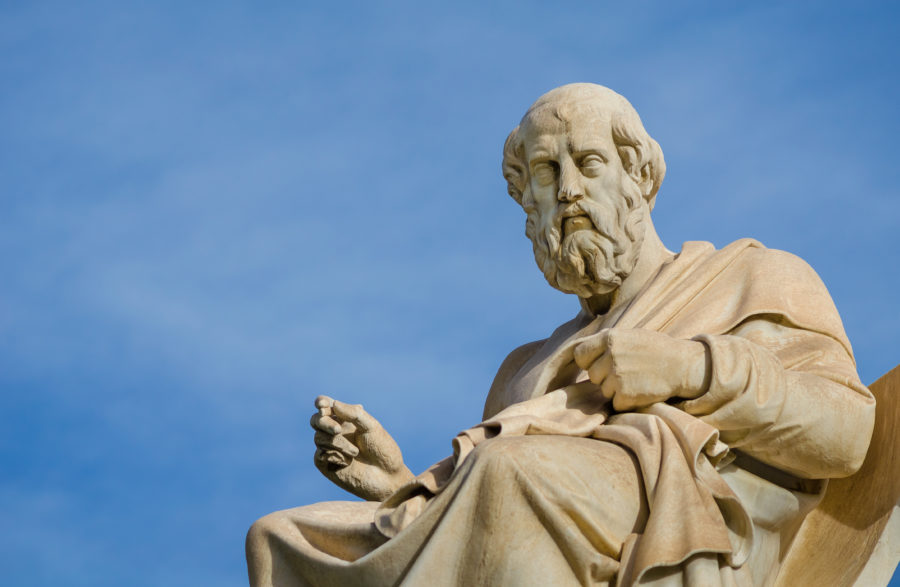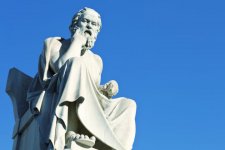Menu
Install the app
How to install the app on iOS
Follow along with the video below to see how to install our site as a web app on your home screen.
Note: This feature may not be available in some browsers.
You are using an out of date browser. It may not display this or other websites correctly.
You should upgrade or use an alternative browser.
You should upgrade or use an alternative browser.
Greek History Community
Who are your favorite Greek philosophers?
- Thread starter cf_fraiser
- Start date
1 - 7 of 7 Posts
Vangelis
Active member
I remember doing this at school and thinking what is this rubbish they are teaching us? Now, I find myself quoting it all the time!Aristotle for sure. I love the allegory of the cave
francescool
Active member
Same!! The more we learn the more were able to learnI remember doing this at school and thinking what is this rubbish they are teaching us? Now, I find myself quoting it all the time!
k_tsoukalas
Administrator
I think it is a good idea to start with an overview. There are many philosophers, and all came about at different time periods and have different, conflicting beliefs. Maybe start here?

 www.greekboston.com
www.greekboston.com

Top Ancient Greek Philosophers
Here's a look at the top ten ancient Greek philosophers.
1 - 7 of 7 Posts
JOIN THE DISCUSSION AND READ OTHER GREEK INFO:
Family Trees
- Rízes Hellenic Genealogy
- Greek History Forum
- Replies: 0
Hey fellow members,
As we traverse the rich tapestry of Greek culture and history on this platform, I've been pondering something quite fascinating: our family histories. How many of us have delved into the intricate branches of our family trees?
Genealogy, the study of family history and lineage, often unveils captivating stories, connections, and traditions passed down through generations. Whether you're just beginning to trace your ancestry or have been meticulously documenting it for years, I'd love to hear about your experiences.
Here are a few questions to spark our discussion:
Looking forward to our discussion,
RizeGen
As we traverse the rich tapestry of Greek culture and history on this platform, I've been pondering something quite fascinating: our family histories. How many of us have delved into the intricate branches of our family trees?
Genealogy, the study of family history and lineage, often unveils captivating stories, connections, and traditions passed down through generations. Whether you're just beginning to trace your ancestry or have been meticulously documenting it for years, I'd love to hear about your experiences.
Here are a few questions to spark our discussion:
- What inspired you to start researching your family history?
- Have you encountered any unexpected discoveries or fascinating tales along the way?
- What resources or tools have you found most helpful in your genealogical journey?
- Do you have any tips or advice for someone interested in starting their own family tree?
Looking forward to our discussion,
RizeGen
Greek Independence Day History
- redsoxdw_
- Greek History Forum
- Replies: 1
Greek Independence Day is coming up! I thought I would share a bit that I know about the history. Please chime in with corrections or anything to add!
- The Spark of Revolution: Greek Independence Day marks the day in 1821 when the Greeks began their revolt against the Ottoman Empire, a state that had controlled Greece for nearly 400 years. This revolt was influenced by the surge of nationalism throughout Europe and inspired by the Enlightenment ideals of liberty, equality, and fraternity.
- A Poet’s Declaration: The revolution officially began after Bishop Germanos of Patras raised the Greek flag at the Monastery of Agia Lavra in Peloponnese, symbolizing the call to arms. However, it was rumored that the war of independence was actually declared a few days earlier by Alexandros Ypsilantis, a Greek national hero, in the Danubian Principalities.
- International Support: The Greek fight for independence was not just a local effort; it garnered substantial international support from prominent figures such as Lord Byron from Britain, who notably spent his own money and later died in Greece, contributing to the Greek cause. This international backing was crucial for the morale of the Greek fighters and helped in diplomatic efforts later on.
- The Battle of Navarino: A pivotal point in the Greek War of Independence was the Battle of Navarino in 1827, where the combined fleets of Britain, France, and Russia defeated the Ottoman and Egyptian fleets. This naval battle marked a significant turning point that led to the eventual independence of Greece.
- Recognition and Autonomy: Greek Independence was formally recognized in 1830 by the Treaty of London. However, full sovereignty and the delineation of the Greek borders were not achieved until later. It allowed the foundation of the modern Greek state, under the governance of King Otto from Bavaria.
Learning about Greek Independence Day
- cubrinj
- Greek History Forum
- Replies: 1
March 25th marks a significant celebration in Greece, but I realize my knowledge on its historical context is quite limited.
From what I understand, this day commemorates the start of the War of Greek Independence in 1821, where Greece sought to end several centuries of Ottoman rule. However, I'm eager to learn more about the intricacies of this period, the key figures involved, and how the struggle for independence unfolded over time.
Additionally, I'd be interested in understanding how this day is celebrated across Greece today and whether any particular traditions are tied to it. For example, are there specific ceremonies, parades, or family traditions that uniquely mark this day in Greek culture?

From what I understand, this day commemorates the start of the War of Greek Independence in 1821, where Greece sought to end several centuries of Ottoman rule. However, I'm eager to learn more about the intricacies of this period, the key figures involved, and how the struggle for independence unfolded over time.
Additionally, I'd be interested in understanding how this day is celebrated across Greece today and whether any particular traditions are tied to it. For example, are there specific ceremonies, parades, or family traditions that uniquely mark this day in Greek culture?

Interesting Greek History Topics I Like
- redsoxdw_
- Greek History Forum
- Replies: 2
The Persian Wars: The wars fought between Greece and the Persian empire in the 5th century BC were some of the most consequential conflicts of ancient times. Learn about the key events, such as the Battle of Marathon and the Battle of Thermopylae, and the strategies that allowed the Greeks to repel the Persian invaders.
The Rise of Athens: Arguably the most influential city-state in ancient Greece, Athens was the birthplace of democracy, philosophy, and the arts. Follow the rise of Athens from a humble village to a powerhouse of trade and culture.
The Peloponnesian War: The decades-long conflict between Athens and Sparta was a turning point in Greek history, leading to the decline of Athens and the rise of Macedon under Philip II and his son Alexander.
The Life of Alexander the Great: The young conqueror who led his armies across the known world, Alexander the Great is one of the most famous and admired figures of ancient history. Learn about his upbringing, his conquests, and his legacy.
The Olympic Games: A tradition that continues to this day, the ancient Olympics were a celebration of sports, culture, and political power. Explore the origins of the games and the events that took place.
The Rise of Athens: Arguably the most influential city-state in ancient Greece, Athens was the birthplace of democracy, philosophy, and the arts. Follow the rise of Athens from a humble village to a powerhouse of trade and culture.
The Peloponnesian War: The decades-long conflict between Athens and Sparta was a turning point in Greek history, leading to the decline of Athens and the rise of Macedon under Philip II and his son Alexander.
The Life of Alexander the Great: The young conqueror who led his armies across the known world, Alexander the Great is one of the most famous and admired figures of ancient history. Learn about his upbringing, his conquests, and his legacy.
The Olympic Games: A tradition that continues to this day, the ancient Olympics were a celebration of sports, culture, and political power. Explore the origins of the games and the events that took place.
Athens and the creation of democracy
- mastichas09
- Greek History Forum
- Replies: 1
I've been thinking about Athens and how it's the birth of democracy. I wondered if other societies had experimented with the concepts or if Athens was unique? Does anyone know? I know that there's been some evidence that other societies experimented with community leadership, but none had a true democracy like what Athens developed.
It was unique in developing a system where a significant portion of its inhabitants could participate directly in decision-making processes. This early form of democracy was largely initiated under the leadership of Cleisthenes in 508/507 BC. His reforms reorganized the population into ten tribes based on their residence rather than lineage, promoting a broader and more inclusive political engagement.
In this Athenian democracy, citizens had the right to attend the Assembly (Ekklesia), where they could speak and vote on legislation and executive decisions. The Council of Five Hundred (Boule), selected by lot for each of the ten tribes, proposed legislation and handled daily affairs. This lottery system for public office sought to prevent power monopolies and encourage civic participation.
I know that this work truly influenced other democratic governments through the world!
Feel free to chime in with your thoughts- I find this stuff interesting.
It was unique in developing a system where a significant portion of its inhabitants could participate directly in decision-making processes. This early form of democracy was largely initiated under the leadership of Cleisthenes in 508/507 BC. His reforms reorganized the population into ten tribes based on their residence rather than lineage, promoting a broader and more inclusive political engagement.
In this Athenian democracy, citizens had the right to attend the Assembly (Ekklesia), where they could speak and vote on legislation and executive decisions. The Council of Five Hundred (Boule), selected by lot for each of the ten tribes, proposed legislation and handled daily affairs. This lottery system for public office sought to prevent power monopolies and encourage civic participation.
I know that this work truly influenced other democratic governments through the world!
Feel free to chime in with your thoughts- I find this stuff interesting.
Share and discuss Greek history!
WorldwideGreeks.com is a free online forum community where people can discuss Greek food, travel, traditions, history and mythology.
Join Worldwide Greeks here!
Join Worldwide Greeks here!
JOIN COMMUNITY FOR FREE
LOGIN TO YOUR ACCOUNT



